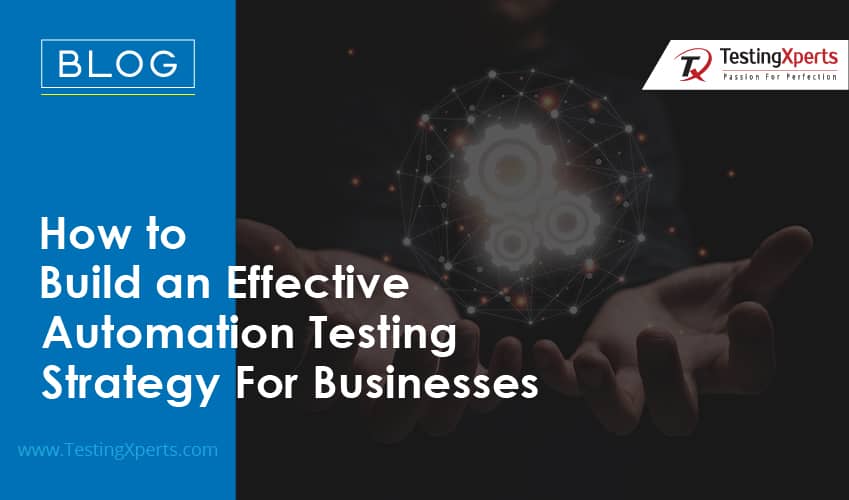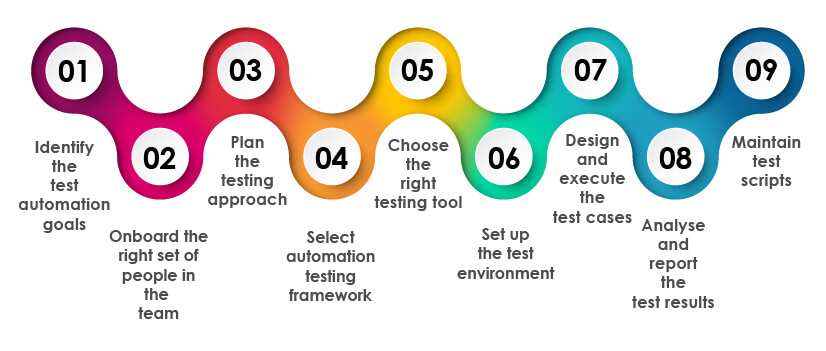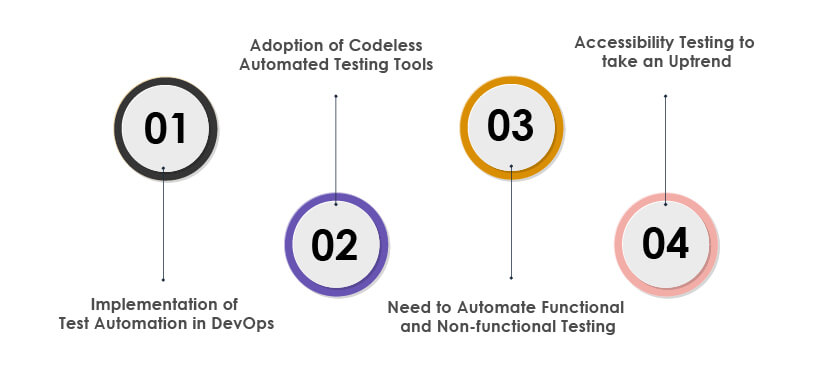Recommended Blogs
How to Build an Effective Automation Testing Strategy For Businesses

Within today’s rapidly shifting commercial environment, keeping ahead of rivals necessitates releasing top-quality software promptly to customers. To accomplish this, software testing plays a critical role. Businesses in the United Kingdom utilize several software testing methods for ensuring quality. Functional, regression, and smoke testing check that features work as intended. Non-functional testing verifies performance under different conditions.
With accelerated software delivery through DevOps and agile frameworks, test automation has become a premier strategy. It allows quicker, steadier releases by automating the validation of features and functionality. Automated scripts can run tests repeatedly and on a scale. This facilitates catching issues early while preserving human resources. Overall, automated testing through continuous integration and deployment helps U.K. companies accelerate time to market while still delivering bug-free software.
What is Automated Testing?
Software testing automation employs sophisticated tools and platforms to assess computer programs. This technique necessitates less human participation than conventional testing methods. Specifically, it entails drafting scripts and executing them through automation programs to evaluate software performance. By leveraging automated processes, quality assurance efforts can achieve thorough coverage within tighter timeframes using fewer resources.
This testing methodology helps software teams streamline repetitive tasks. Automating such duties decreases the time and expenses associated with regression testing. This approach moves the overall testing process at an accelerated pace while significantly cutting down the testing cycle. Careful automation of standard procedures allows teams to focus their valuable time and skills on more challenging issues, ultimately improving quality and efficiency.
A dedicated quality assurance automation testing professional holds an essential position within software firms. These individuals draft and construct testing scripts during the early stages of a project. Working closely in cooperation with automation testers and product designers, they guarantee thorough testing of software and products. As an integral part of a cohesive team, that oversee test automation efforts, leveraging various automated testing systems and software testing automation instruments to recognize the most impactful methodology for successful test automation.
It has been noted that the software automation testing market has been rapidly growing in recent years. The global automation testing market will increase from USD 12.6 billion in 2019 to USD 28.8 billion by 2024. The compound annual growth rate (CAGR) will be 18.0% during the forecast period of 2019-2024. According to GlobeNewswire, the automation testing market is expected to reach USD 68 billion by 2025. This growth is possible by integrating IoT, DevOps, and A.I. technologies. It led businesses to adopt automation solutions, which increased demand for this market. Companies must implement a dependable automation testing plan that will guarantee quicker software updates and better user experience by enhancing their software product quality.
Why is Automation Testing Important?
Relying solely on human testers can create bottlenecks as applications grow more intricate and teams want quicker rollouts. This is where automated testing helps. Let’s examine a few ways automation testing improves the process:
• Accelerates the testing process and reduces time-to-market
• Consistently carrying out thorough tests serves to strengthen evaluation coverage and quality assurance by systematically implementing comprehensive checks.
• By removing the potential for human mistakes, this method enhances the accuracy of test cases
• Aims to maximize efficiency by minimising manual labor and allowing multiple tests to run simultaneously. It works to optimize costs
• Allows organizations to respond swiftly to market demands and gain a competitive edge
• Reduces the chances of significant problems affecting end-users
Types of Automation Testing
Automation Testing
The field of automation testing utilizes many approaches and methodologies, each fulfilling a unique role during testing. By capitalizing on automation’s capabilities, companies can accomplish quicker time to launch, enhanced excellence, and decreased expenses. Let us outline the various kinds of automation testing and where they apply:
Unit Tests
Unit testing focuses on validating individual parts of a program to confirm they work as intended. Software engineers usually perform unit assessments, utilizing platforms like JUnit for Java or NUnit, .NET. These evaluations center around separating little pieces of code, making recognising bugs or issues faster in the development cycle. Unit testing advances code reusability, improves supportability, and assists with forestalling relapse blunders.
Functional Tests
Functional tests ensure that software applications fulfil their intended purposes and perform as required. It examines the system’s behaviors by evaluating its functions, capabilities, and user interactions.
Selenium, Appium, and Cypress are generally utilized for functionality testing web and mobile applications. Automating repetitive tests enables organizations to enhance precision and reduce work. This leads to smooth application functionality.
Integration Tests
Integration testing centres around validating the interactions between distinct parts or modules of a program. It confirms that the interconnected pieces work seamlessly together and interchange data accurately.
Specialized software programs frequently utilized for interface validation efforts. Tools like Apache JMeter, SoapUI, or Postman are commonly leveraged to assess integration between independent components. This form of testing aids in identifying issues with data handoffs, transmission faults, and compatibility inconsistencies. By detecting such problems early, developers can efficiently remedy situations before they impact end users or other downstream operations.
Performance Tests
Performance testing evaluates how a software application responds, remains stable, scales accordingly, and utilizes resources when subjected to varying workload levels. Tools like JMeter, LoadRunner, and Gatling automatically simulate real-world scenarios. The goal is to measure and analyze system behavior. This process helps companies find and fix performance issues. Automated performance testing delivers useful knowledge about system capabilities, ensuring maximum performance and a positive user experience.
Security Tests
In today’s digital era, protecting sensitive information from cyber threats has become crucial to safeguarding data and maintaining system reliability. This form of evaluation identifies susceptibilities, errors, or weaknesses within an application’s security framework that could potentially be exploited. By methodically analysing various components, security testing works to discover any cracks in a program’s armour so issues can be resolved proactively rather than reactively after harm has already occurred. Such diligence helps bolster an organization’s defences and mitigate risks to the sensitive user and business details.
Security evaluation tools such as OWASP ZAP help pinpoint protection flaws. These instruments also authenticate encryption techniques and bar possible infringements. Automated security assessment supports keeping information private, intact, and accessible.
Regression Tests
Regression testing verifies that recent changes or updates to software do not adversely impact existing functionalities. It helps guarantee that new features or bug fixes avoid introducing new problems or disrupting previously functioning components. By methodically evaluating software updates through regression testing, programmers can determine whether code alterations negatively affect performance in any unforeseen manner.
Reduced errors, time savings, and thorough test coverage are achieved through automated regression testing. It also enables continuous integration and continuous delivery pipelines.
How do you build an effective automation testing strategy?
Creating a carefully designed automation testing approach is crucial. It will guarantee success for the automated software testing procedure. Implementing such a strategy provides numerous advantages. Some of the advantages involve improved test coverage, increased test dependability, faster time-to-market, and swifter return on investment. Organizations must embrace the following methodology for an effective software test automation strategy.

Identify the Automation Testing Goals
Defining objectives before initiating automated software testing is crucial, as it maintains the process on course. Objectives may include quicker testing implementation, enhanced testing outcomes, elevated accuracy, diminished regression period, cost reduction, and additional factors.
Onboard the correct set of people in the team
When establishing automation objectives, assembling an appropriate team is paramount. Experience executing test cases and developing scripts is invaluable. The team must design test procedures, execute evaluations, investigate failures, refine scripts as needed, and generate regression tests to ensure continued performance over time. A well-rounded staff with diverse, applicable abilities work together systematically to help accomplish goals through quality automation.
Plan the testing approach
With the proper team in place and responsibilities assigned, planning the testing method is the next crucial step. First, identifying what portions will be tested automatically is key. Next, choosing whether tests will be written at a basic or broader scope level needs addressing. Finally, opting for a test to implement wraps up the planning process.
Select automation testing framework
Guidelines must be established for creating and executing tests. Teams can opt for frameworks like Linear scripting (record and playback), Library architecture testing framework, Modular testing framework, or Data-driven testing framework, depending on their needs. These frameworks provide structure when automating tests.
Choose the right testing tool
When selecting the proper testing instrument for a fruitful automated software testing procedure, several important criteria must be examined. To opt for the most suitable testing tool, one ought to evaluate its compatibility with the current project’s technological framework, programming language backing, trial environment sanction, internet browser, working framework (O.S.) support, cell/desktop/web application, and so on.
Set up the test environment
With the preceding tasks completed, establishing the test setting for carrying out evaluations is the subsequent stage. To outfit the test environment, procure the required hardware and software capabilities needed to conduct the testing.
Design and execute the test cases
At this pivotal stage, test scripts are authored and carried out. When crafting the test scripts, ensure reusability, well-organised structure, and thorough documentation. Once the test scripts have been written, perform executions using automation testing frameworks and instruments.
Analyse and report the test results
Ultimately, upon completion of the testing process, it is crucial to evaluate the test outcomes to determine what went amiss, what necessitates correction or enhancement, how successful the testing proved, and more. Distributing the test results and discoveries to all invested parties is imperative.
Maintain test scripts
It is important as a final step to maintain the test scripts in a way that allows for their reuse in regression testing or evaluation of similar software programs. Test cases should also be reviewed regularly, removing any that are obsolete while adding new ones to the repository. These practices ensure effective test automation and the future applicability of the scripts.
Creating a strategic test automation approach and incorporating current testing technologies are essential for companies wanting to remain competitive. To have a productive automation testing process, organisations must establish an effective strategy and adopt new automation testing methods. This allows businesses to test software efficiently and keep up with the constantly changing market.
4 Major Automation Testing Trends

Implementation of Test Automation in DevOps
DevOps has been in practice for some time now, but the use of test automation in DevOps is said to have increased significantly. According to EIN Presswire, the automation testing market is expected to grow from USD 8 billion in 2018 to USD 60.4 billion by 2026, at a CAGR of 33.4% during the forecast period 2018-2026. The automation testing market growth is due to the rising demand for DevOps in automation.
In addition, companies can advance DevOps capabilities by expanding automated testing implementation and utilizing strong automated security testing services. This enhances protection and guarantees early and continuous security evaluation across the entire software delivery process. Some of the top automated testing tools for DevOps and constant testing include Test Sigma, Selenium, and Appium.
Adoption of Codeless Automated Testing Tools
Adopting automated testing tools without coding will be a primary pattern in the coming year. As stated in the Perfecto Report called “The 2021 State of Test Automation Report,” 40% of companies want to use codeless remedies.
Codeless automation testing is a methodology for generating automated tests without writing source code. It involves leveraging codeless testing platforms constructed using artificial intelligence and visual modelling techniques. Codeless testing provides various benefits. It offers straightforward usability, expedited test execution, optimal resource utilization, and more advantages. Some of the premier codeless test automation solutions include Katalon Studio, Test Craft, Perfecto, and other leading options.
Need to Automate Functional and Non-functional Testing
There is an expectation for notable growth in the realm of software testing automation. It is imperative to automate both functional and non-functional testing evaluations. This involves performance testing, security testing, accessibility testing, and usability testing. A variety of metrics must always be considered to achieve well-rounded testing: perplexity, which measures complexity, and burstiness, which assesses variation between sentences.
Utilizing some more prolonged or more elaborate sentences alongside shorter, punchy ones with abundant diversity helps mimic natural human speech patterns. Furthermore, avoiding commas when joining independent clauses with coordinating conjunctions upholds.
In today’s competition, businesses must deliver high-quality software to customers. Automating the software testing process is the best method to overcome this challenge. By doing so, companies can expand test coverage and achieve faster test execution. It will also ensure high-quality products and reduce time-to-market.
However, software testing process automation is only possible with quality automation tools. Tools like Selenium, Trecentist Tosca, etc., are suitable for functional tests. Tools like JMeter, Neo load, etc., are ideal for non-functional tests.
Accessibility Testing to take an Uptrend
Accessibility testing is anticipated to become an increasingly significant trend. A GlobeNewswire report predicts that the accessibility testing market will reach $606.46 million by 2027. As companies implement digital solutions, the need for accessible software is also expanding. With businesses adopting more online platforms, ensuring users of all capabilities can access information equally will be paramount. Conformance with accessibility guidelines aims to provide equitable digital experiences for all. Businesses must ensure that their software is accessible to everyone. It includes individuals with blindness, motor impairment, color blindness, etc. Companies should ensure their apps follow specific accessibility guidelines such as W3C’s, i.e., WCAG 2.0, WCAG 2.1, Section 508, Stanca Act, etc. Businesses can leverage various accessibility testing tools such as Dyno mapper, WAVE, JAWS, etc.
Conclusion
DevOps continues to grow in popularity within the United Kingdom. This explains why automated software testing has become crucial for companies in the U.K. This testing technique will see substantial expansion in the coming years. The merging of A.I. and ML technologies will accompany it. Firms ought to utilize automation to achieve quicker releases and guarantee high-quality products. It will help them gain an early industry presence to enhance customer experience (CX). Enterprises should capitalize on next-gen Q.A. and independent software testing service providers for the test automation in the DevOps application.
How can TestingXperts (Tx) help Your Business in the United Kingdom?
TestingXperts has led the way in providing test automation solutions for clients across various sectors. Our qualified assurance teams are well-versed in open-source and commercial automation tools to understand the advantages of mechanized testing. We have experienced quality analysts who know about open-source and paid automation tools to address the benefits of automation testing.
Tx has an in-house extensible automation framework, Tx-Automate, which is modular, reusable, and compatible and can be customized based on the business need.
Our quality assurance specialists have implemented robotics process automation testing solutions using UiPath for clients around the world. This incorporates Spotify, well-known music streaming business in Sweden and the United States.
Why Choose Our Automation Testing Service?
• Expertise in diverse types of automation testing, including functional testing, regression testing, and performance testing.
• A strong automated testing structure for productive script evolution, implementation
• When testing websites, it is crucial to ensure functionality and compatibility across all browsers and platforms through thorough automated testing. A comprehensive testing approach can verify that all elements perform as intended regardless of the specific browser or device being used.
• Strategic use of innovative testing automation.
• Testing websites across various browsers ensures functionality and compatibility. Automated browser testing evaluates how a site displays and operates in different browsers like Chrome, Firefox, Safari, and Internet Explorer.
• Emphasis on continuous test automation learning and skill enhancement.
• It allows testers to assess code in less time compared to manual testing since automated scripts can repeat scenarios consistently.
To know more, contact our QA experts now.
FAQs
An automation testing strategy defines an enterprise’s structured approach to implementing test automation. It includes tool selection, test case prioritisation, framework design, and continuous integration to ensure the quality and speed of software releases. The strategy also helps reduce human error and increase test coverage when testing applications.
A strong automation testing strategy includes key components like clear test objectives, selection of the right tools, identification of test cases for automation, test data management, integration with CI/CD pipelines, and regular maintenance. It ensures efficient test coverage, faster feedback, and improved software quality across development cycles.
The automation testing strategy streamlines the QA process, reduces manual effort, and accelerates release cycles. It ensures better test coverage, enhances reliability, and minimizes defects in production.
Selecting the right tool depends on application type, technology stack, test requirements, and team expertise. Popular choices include Selenium, Appium, and Tricentis Tosca, each catering to specific testing needs.
AI enhances automation by optimizing test case selection, identifying defect patterns, and reducing script maintenance efforts. AI-powered tools enable self-healing scripts, predictive analytics, and faster test execution.
Discover more
